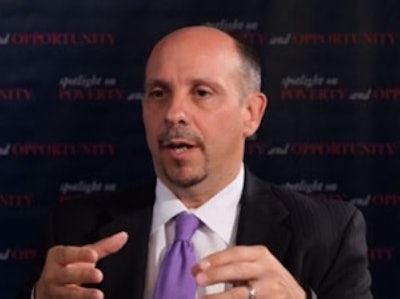Violence and racial chaos in Charlottesville earlier this year sparked a call to action for one philanthropic foundation dedicated to making post-secondary education accessible to all.
Mobilized to back words with action, Jamie Merisotis, president and CEO of the Lumina Foundation, announced Tuesday that the foundation will award $2.5 million in grants for community-building programs and initiatives that address racial justice issues at colleges and universities nationally.
 Lumina President and CEO Jamie Merisotis.
Lumina President and CEO Jamie Merisotis.Lumina’s grants will go to colleges, universities and philanthropic organizations that will improve the racial climate on campuses and “elevate efforts to teach about race and racism in our nation’s history and contemporary life,” according to the foundation.
“Ensuring fair and equitable results in a country sullied by an enduring legacy of systemic racism and oppression is not just a part of our collective work in philanthropy,” Merisotis said. “It is the work.”
Merisotis added that the call to action is not only for Lumina, but for every philanthropic organization seeking to fuel social change.
“Foundations such as Lumina typically aren’t the first responders to crises, but in this historic climate, we believe the time to act is now,” he said in the announcement on the foundation’s website . “We know the challenge isn’t just to do the right thing – it’s also to bring others along. So, our decision to act – and to join a growing choir of university, student, philanthropic, and community voices in this effort – is an embrace of optimism.”
The first of the Lumina investments is a $200,000 grant awarded to Christian Theological Seminary’s Faith and Action Project in Indianapolis, where Lumina is headquartered and a place where the organization says it has a leadership responsibility to make itself heard on racial justice and equity issues. The Faith and Action Project will host events that highlight solution-driven approaches to community problems rooted in racial bias and inequity, Merisotis said.
Higher education institutions will see several levels of financial support depending on how proactive they are around issues on racial justice. Schools already making significant efforts to improve educational equity and advance anti-racism education will receive up to $100,000.
Smaller grants will be offered to schools looking to improve or expand plans for campus-wide engagements promoting racial justice. Such schools are those that have committed to helping students of color complete their degrees and those committed to expanding programs that examine and educate the campus community on the nation’s racial history.
Further, Lumina’s support of three national philanthropy-serving organizations –- the Council on Foundations, Grantmakers for Education, and Independent Sector –- will produce webinars, trainings and meetings to enhance philanthropic practice around racial justice. All three organizations have received grants of $100,000 each.
Through a partnership with Rockefeller Philanthropy Advisors, Lumina will offer smaller gifts to “catalyze community conversations” and education efforts about race, racism and “the campus climate around race,” Merisotis said.
Merisotis said that Lumina’s efforts are ultimately aimed at closing the educational attainment gaps across race. The foundation hopes to do this by educating and training faculty, staff and students, and encouraging “campus and community forums, new learning and student support approaches, speaker series, and student mobilization.”
The foundation recognizes that the financial investments on their own will not solve the underlying problems plaguing the nation. However, Lumina says people and organizations can be a partner with others for shaping the national landscape.
Lumina, with Rockefeller, will award another gift of $1 million to launch a national study of the racial climate on campuses.
“Part of what we hope will happen with this work is that there will be a greater understanding about both the challenges that racial injustice and inequity present and the fact that there are opportunities that result from those challenges to improve harmony, to enhance prosperity, to actually get to better point collectively as a society,” Merisotis said.
Tiffany Pennamon can be reached at [email protected]. You can follow her on Twitter @tiffanypennamon.





















